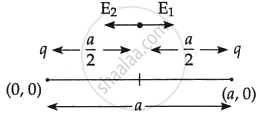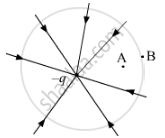Advertisements
Advertisements
प्रश्न
Consider two identical point charges located at points (0, 0) and (a, 0).
Is there a point on the line joining them at which the electric field is zero?
उत्तर

Let at `a/2`:
`E_1 = (Kq)/(a"/"2)^2`
`E_2 = (Kq)/(a"/"2)^2`
The net electric field at a/2:
Enet = E1 - E2
∵ E1 = E2
Enet = 0
at `a/2`
So `a/2` is a point where the electric field is zero.
APPEARS IN
संबंधित प्रश्न
What is the amount of work done in moving a point charge Q around a circular arc of radius ‘r’ at the centre of which another point charge ‘q’ is located?
The field lines of a negative point charge are as shown in the figure. Does the kinetic energy of a small negative charge increase or decrease in going from B to A?

Why must electrostatic field at the surface of a charged conductor be normal to the surface at every point? Give reason?
The intensity of the electric field at a point at a perpendicular distance ‘r’ from an infinite line charge, having linear charge density ‘λ’ is given by:
A charged oil drop weighing 1.6 x 10-15 N is found to remain suspended in a uniform electric field of intensity 2 x 103 Nc-1. Find the charge on the drop.
A solid sphere of radius R has a charge Q distributed in its volume with a charge density ρ = kra, where k and a are constants and r is the distance from its centre. If the electric field at r = `"R"/2` is `1/8` times that at r = R, the value of a is ______.
An electron falls from rest through a vertical distance h in a uniform and vertically upward directed electric field E. The direction of electric field is now reversed, keeping its magnitude the same. A proton is allowed to fall from rest in it through the same vertical distance h. The time of fall of the electron, in comparison to the time of fall of the proton is ______.
Consider two identical point charges located at points (0, 0) and (a, 0).
Is there a point on the line joining them at which the electric potential is zero?
